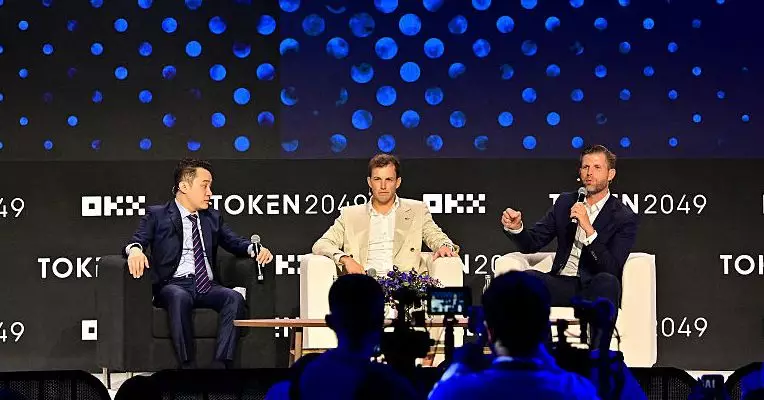The crypto landscape is often characterized by its rapid growth and volatile nature, but recent endeavors by World Liberty Financial have elevated the conversation around ethical considerations and potential conflicts of interest to unprecedented levels. As the company, partly owned by the Trump family, ventures internationally, especially in regions like the Middle East, it raises significant questions about the intersection of business and politics. The participation of Eric Trump at the Token2049 conference in Dubai, alongside industry stakeholders like Zachary Witkoff, signals an aggressive expansion strategy that merits scrutiny.
World Liberty Financial’s announcement of its new stablecoin, USD1, not only positions it as a significant player in the crypto market but also aligns it with influential entities such as MGX, which is actively investing in prominent platforms like Binance. The implications of such partnerships extend beyond mere financial profit; they touch upon the essential issue of ethical governance amid an increasingly blurred line between private interests and public duties.
Understanding Stablecoins and Their Mechanisms
Stablecoins, such as USD1, are designed to provide stability in an inherently unpredictable market. They derive their value from reserves of cash and other assets that theoretically guarantee the coin’s exchangeability for dollars at a consistent rate. In theory, this model serves a practical purpose—facilitating transactions without fear of drastic price swings typical in traditional cryptocurrencies. However, the very foundation of this stability raises questions regarding who benefits from the system and who stands to lose should the dynamics shift.
World Liberty Financial’s operational model, which involves utilizing a portion of the US dollars received from the sales of USD1 to invest in government bonds, exposes it to market fluctuations and interest rate changes. Currently, short-term Treasuries offer a return exceeding 4%, meaning the potential for profits is considerable. Yet, this reliance on expanded coin circulation creates a direct correlation between the company’s success and its influence in the market. Should their dealings lead to a massive increase in USD1’s supply, one can’t help but ponder the overarching advantages it confers upon its stakeholders—most notably, the Trump family itself.
Concerns of Influence and Ethical Quandaries
Perhaps the most troubling aspect of this scenario arises from the potential for perceived—or real—corruption. Critics, including monetary policy experts, openly express concerns regarding how financial interactions with foreign powers could inadvertently channel resources into Trump enterprises. As George Selgin pointedly noted, such transactions could very well resemble influence peddling, a practice fundamentally at odds with ethical business conduct.
In a climate where foreign investments can significantly alter economic landscapes, the partnership between World Liberty Financial and entities like MGX amplifies fears around undue influence and favoritism. The implications are particularly grave when they involve a current U.S. president’s family and their corporate interests. The optics alone suggest a troubling relationship between public service and private gain—one that can undermine public trust in governmental institutions.
The Fine Line Between Innovation and Ethics
While innovation in the financial sector is essential for growth, it should not come at the cost of ethical responsibility. The advancements introduced by cryptocurrencies, including stablecoins, come with a clear need for regulatory frameworks that safeguard against conflicts of interest and promote transparency within the industry. The eagerness to capitalize on emerging markets and unfamiliar territories must be tempered with a discerning eye toward ethical implications.
Further complicating matters, the crypto landscape is notoriously resistant to regulation, which creates a haven for potential misuse. Companies like World Liberty Financial must navigate these waters delicately, understanding that their strategic decisions could have far-reaching consequences beyond mere financial success. Maintaining a commitment to ethical standards is not just good practice; it is essential for fostering investor confidence and protecting the integrity of the crypto ecosystem as a whole.
Ultimately, while the allure of crypto’s pioneering frontiers is undeniable, the need for ethical oversight becomes increasingly apparent as significant stakeholders like the Trump family engage in high-stakes financial maneuvers. Balancing innovation with integrity may be one of the greatest challenges facing the crypto industry today.

